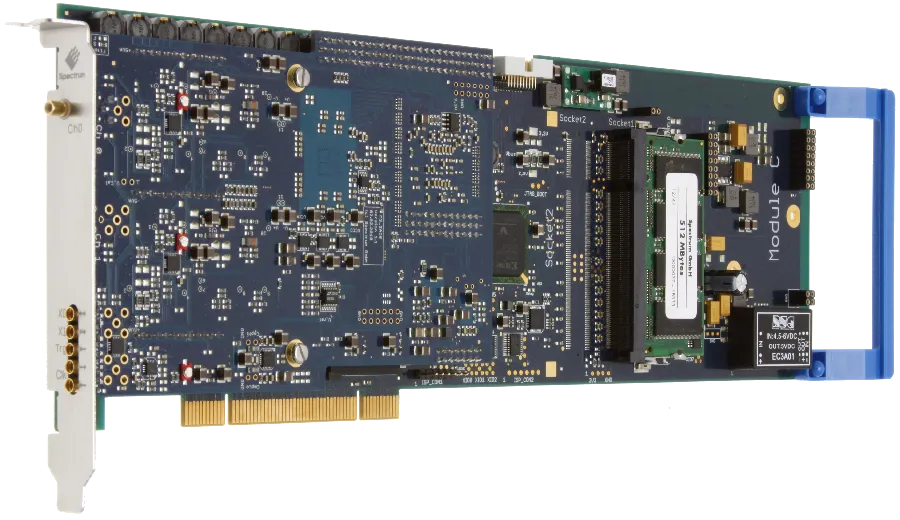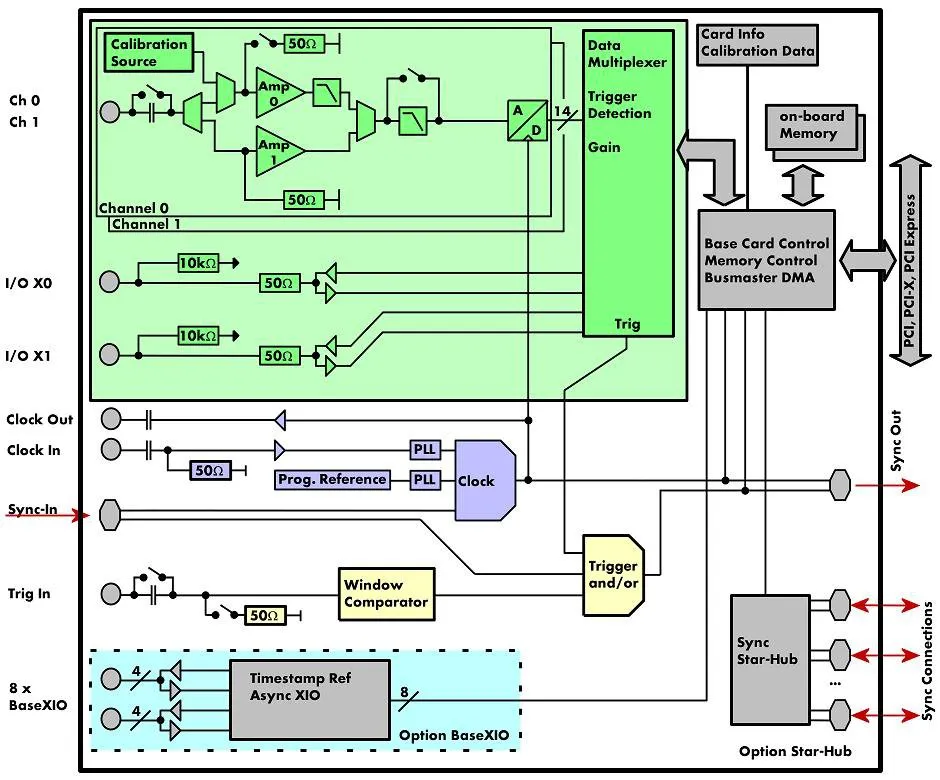THIS PRODUCT IS END-OF-LIFE. Show more about end-life-products policy.
Recommended product:
Product:
M3i.4140
14 bit multi-purpose digitizer
Description:
The 6 models of the M3i.41xx series are designed for the fast and high quality data acquisition. Each of the input channels has its own monolithic A/D converter and its own programmable input amplifier. This allows the recording of signals simultaneously on both channels with 14 bit resolution without any phase delay between them. The card uses only one A/D converter even when running with 400 MS/s, guaranteeing best signal quality without any interleaving technology. The extremely large on-board memory allows long time recording even with the highest sampling rates.
Facts & Features:
- Up to 400 MS/s on 1 channel
- Simultaneously sampling on all channels
- Separate monolithic ADC and amplifier per channel
- Up to 2 synchronous digital channels with multi-purpose I/O
- Up to 1 GSample on-board memory
- 256 MSample standard memory installed
- 6 input ranges: +/-200 mV up to +/-10 V
- Window, re-arm, OR/AND trigger
- Synchronization of up to 8 cards
- 66 MHz 32 bit PCI-X interface
- 5V / 3.3V PCI compatible
- 100% compatible to conventional PCI >= V2.1
- Sustained streaming mode up to 245 MB/s
Application examples:
- High Energy Physics
- Research and Development
- Radar
- Spectroscopy
- Laser Applications

The ABA mode combines slow continuous data recording with fast acquisition on trigger events. The ABA mode works like a slow data logger combined with a fast digitizer. The exact position of the trigger events is stored as timestamps in an extra memory.
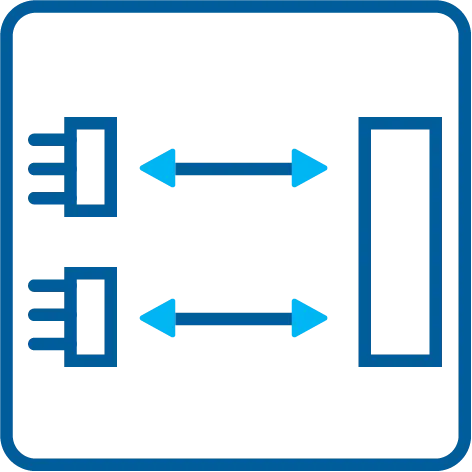
BaseXIO (Optional)
The BaseXIO option offers 8 asynchronous digital I/O lines on the base card. The direction can be selected by software in groups of four. Two of these lines can also be used as additional external trigger sources. This allows the building of complex trigger conjunctions with external gated triggers as well as AND/OR conjunction of multiple external trigger sources like, for example, the picture and row synchronisation of video signals. In addition one of the I/O lines can be used as reference clock for the Timestamp counter.
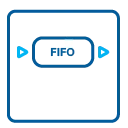
FIFO mode
The FIFO mode is designed for continuous data transfer between measurement board and PC memory (up to 245 MB/s on a PCI-X slot, up to 125 MB/s on a PCI slot and up to 160 MB/s on a PCIe slot) or hard disk. The control of the data stream is done automatically by the driver on interrupt request. The complete installed on-board memory is used for buffer data, making the continuous streaming extremely reliable.

Star-Hub (Optional)
The star-hub is an additional module allowing the phase stable synchronization of up to 8 boards in one system. Independent of the number of boards there is no phase delay between all channels. The star-hub distributes trigger and clock information between all boards. As a result all connected boards are running with the same clock and the same trigger. All trigger sources can be combined with OR allowing all channels of all cards to be trigger source at the same time. The star-hub is available as 4 card and 8 card version. The 4 card version doesn't need an extra slot.
Channel Trigger
The data acquisition boards offer a wide variety of trigger modes. Besides the standard signal checking for level and edge as known from oscilloscopes it's also possible to define a window trigger. Trigger conditions can be combined with logical conjunctions like OR to adopt to different application scenarios.

External Trigger
All boards can be triggered using a separate external trigger signal with a two level programmable window comparator. It's possible to use positive or negative edge. An internally recognized trigger event can - when activated by software - be routed to a multi purpose i/o connector to start external instruments.
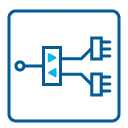
Multi Purpose I/O
The card offers universal multi purpose I/O lines, which can be separately programmed as either input or output. These lines can be used as additional TTL trigger inputs for more complex trigger conditions.

Timestamp
The timestamp option writes the time positions of the trigger events in an extra memory. The timestamps are relative to the start of recording, a defined zero time, externally synchronized to a radio clock, or a GPS receiver. With this option acquisitions of systems on different locations can be set in a precise time relation.
External Clock
Using a dedicated connector a sampling clock can be fed in from an external system. It's also possible to output the internally used sampling clock to synchronize external equipment to this clock.

High Precision PLL
The internal sampling clock of the card is generated using a high precision PLL. This powerful device allows to select the sampling rate with a fine step size making it possible to perfectly adopt to different measurement tasks. Most other cards on the market only allow the setup of fixed sampling rates like 100 MS/s, 50 MS/s, 25 MS/s, 10 MS/s, ... without any possibility to set the sampling rate to any value in between.
Reference Clock
The option to use a precise external reference clock (normally 10 MHz) is necessary to synchronize the board for high-quality measurements with external equipment (like a signal source). It's also possible to enhance the quality of the sampling clock in this way. The driver automatically generates the requested sampling clock from the fed in reference clock.
Selectable AC/DC Coupling
Each analog channel contains a software selectable AC/DC coupling. When using the DC coupling all frequency parts of the signal including the DC offset are acquired. Selecting the AC coupling will only acquire frequency parts of the signal that are above a defined minimum bandwidth.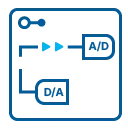
On-board Calibration
The on-board calibration can be run on user request and calibrates the amplifier against a dedicated internal high precision calibration source. After this calibration data is stored permanently in an on-board EEPROM and is automatically used for further acquisitions.
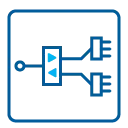
Digital Inputs (Optional)
This option acquires additional synchronous digital channels phase-stable with the analog data. When the option is installed and activated additional digital inputs are stored in the unused bits of each ADC word (2 digital inputs on 14 bit A/D and 4 digital inputs on 12 bit A/D)

Programmable Input Amplifiers
The analog inputs can be adapted to real world signals using a wide variety of settings that are individual for each channel. By using software commands the input termination can be changed between 50 Ohm and 1 MOhm and one can select an input range matching the real world signal.Selectable Input Path
For each of the analog channels the user has the choice between two analog input paths, both offering the highest flexibility when it comes to input ranges. The Buffered path has 1 MOhm termination that allows to connect standard oscilloscope probes to the card. The HF path on the other hand provides the highest bandwidth and the best signal integrity having a fixed 50 Ohm termination.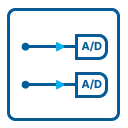

Selectable Low Pass Filter
Each analog channel contains a software selectable low-pass filter to limit the input bandwidth. Reducing the analog input bandwidth results in a lower total noise and can be usefull especially with low voltage input signals.
Multi Purpose I/O
All M3i cards offer two universal multi purpose I/O lines, which can be separately programmed as either input or output. When used as outputs, these lines can be used to output card status signals like trigger-armed or to output the trigger to synchronize external equipment.
SMA Connectors (Optional)
As an alternative to the standard SMB and MMCX connections the card can also be equipped with SMA connectors. The SMA connections are available for the analog input signals as well as for two of the additonal connections. These connections must be defined on the purchase order and can be a selection of: Trig-In, Trig-Out, Multi-Purpose X0, Clk-In, Clk-Out.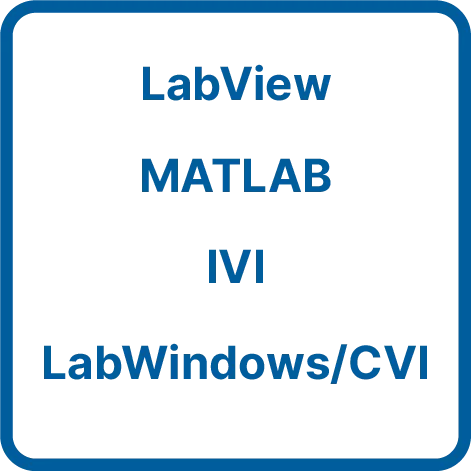
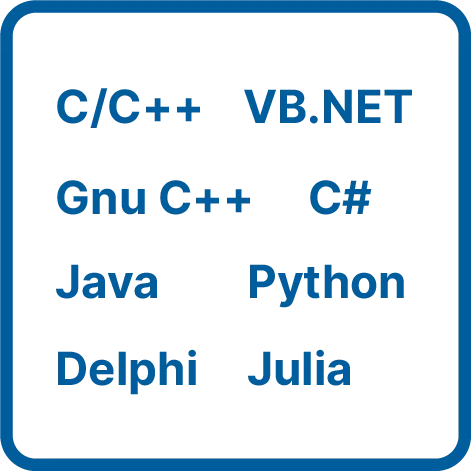
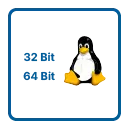


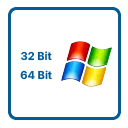
This standard driver is included in the card delivery and it is possible to get the newest driver version free of charge from our homepage at any time. There are no additional SDK fees for the classical text-based programming. All boards are delivered with drivers for Windows 7, Windows 8, Windows 10 and Windows 11, all 32 bit and 64 bit.
| Product | Channels | Max. Samplerate | Max. Bandwidth |
|---|---|---|---|
| M3i.4110 | 1 | 100 MS/s | 50 MHz |
| M3i.4111 | 2 | 100 MS/s | 50 MHz |
| M3i.4120 | 1 | 250 MS/s | 125 MHz |
| M3i.4121 | 2 | 250 MS/s | 125 MHz |
| M3i.4142 | 2 | 400 MS/s | 200 MHz |
| On different platforms | Bus | Max. Bus Transfer speed |
|---|---|---|
| M3i.4140-Exp | PCI Express x1 | 160 MByte/s |
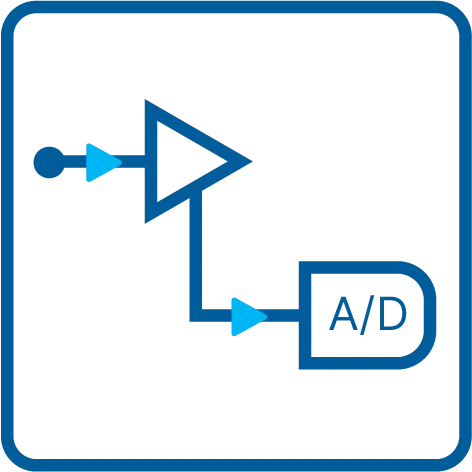
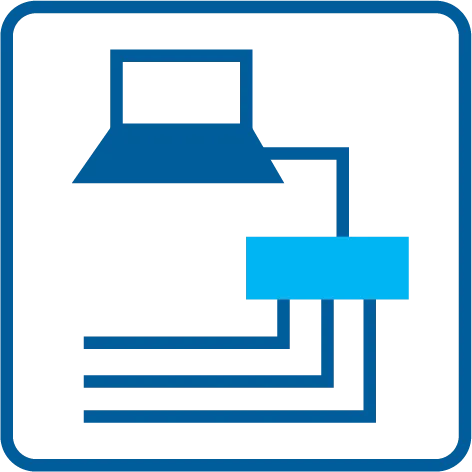
Docking Stations (Optional)
All Spectrum products can be used in 3rd party docking stations, connected by either PCIe interface card or by Thunderbolt interface. Docking stations can extend a standard PC by up to 16 PCIe slots.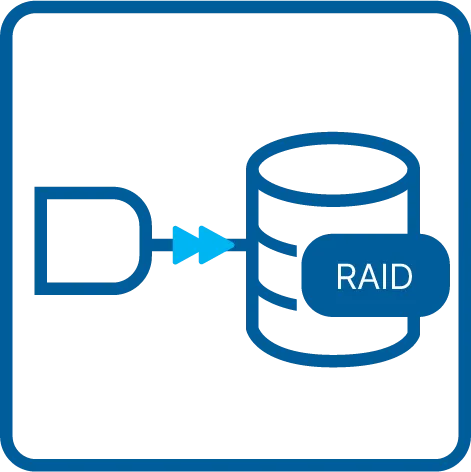
Streaming Systems (Optional)
Combining a number of Spectrum M2p/M2i/M3i/M4i/M5i PCIe digitizers with a Tera-Store Data Streaming solution allows the capture and storage of long complex signals for extended periods of time. With systems available offering from 1 to 32 TB of storage and streaming rates up to 3 GB/s signals can be digitized and stored seamlessly for hours on end.
Documents
Windows driver installation of driver versions < 4.0 |
21.02.2022 | 1 M | ||
Datasheet of the M3i.41xx family |
21.02.2022 | 941 K | ||
Manual of M3i.41xx family |
21.02.2022 | 7 M | ||
Product Discontinuance Notification for M3i.41xx/M3i.41xx-exp Series (200 and 400 MS/s versions) |
21.02.2022 | 231 K | ||
Product Discontinuance Notification for M3i.41xx/M3i.41xx-exp Series, versions with 100 MS/s |
21.02.2022 | 235 K | ||
Datasheet of Spectrum Terastore Streaming System |
21.02.2022 | 910 K | ||
M3i StarHub module datasheet |
21.02.2022 | 142 K | ||
Data sheet of SPA pre-amplifier |
08.12.2023 | 580 K | ||
Data sheet of Docking Station |
21.02.2022 | 166 K | ||
Short Manual for IVI Driver |
21.02.2022 | 532 K | ||
Data sheet of SBench 6 |
15.01.2024 | 999 K | ||
Manual for MATLAB driver M2p/M4i/M4x/M5i/M2i/M3i/DN2/DN6 |
13.12.2023 | 1 M | ||
Manual for LabVIEW drivers for M3i |
21.02.2022 | 2 M | ||
Manual for SBench 6 |
21.02.2022 | 7 M |
WINDOWS DRIVER + SOFTWARE
M2i / M3i driver - last Version for Windows 2000 |
2 | 21.02.2022 | 437 K | |
M2p/M4i/M4x/M5i/M2i/M3i/DN2/DN6 driver for Windows 7, 8, 10, 11 (32/64 bit) |
7.01 | 22.04.2024 | 5 M | |
M2i/M3i/M4i/M4x driver - last Version for Windows 32 XP / Vista |
3.30 | 21.02.2022 | 2 M | |
M2i/M3i/M4i/M4x driver - last Version for Windows 64 XP / Vista |
3.20 | 21.02.2022 | 3 M | |
C/C++ driver header and library files |
7.01 | 22.04.2024 | 43 K | |
Spectrum Control Center - last Version for Windows 2000 |
1.41 | 21.02.2022 | 8 M | |
Spectrum Control Center (32-bit) / Windows 7, 8, 10 |
2.36 | 22.04.2024 | 22 M | |
Spectrum Control Center (64-bit) / Windows 7, 8, 10, 11 |
2.36 | 22.04.2024 | 25 M | |
Spectrum Control Center - last Version for Windows XP |
1.74 | 21.02.2022 | 8 M | |
SBench 6 (32-bit) Installer / Windows 7, 8, 10 |
6.5.08 | 22.04.2024 | 36 M | |
SBench 6 (64-bit) Installer / Windows 7, 8, 10, 11 |
6.5.08 | 22.04.2024 | 39 M | |
SBench6 - last Version for Windows XP |
6.3.5 | 21.02.2022 | 41 M | |
Windows Installer for Remote Server Option |
22.04.2024 | 13 M | ||
IVI Driver for IVI Digitizer class (32 bit) |
22.04.2024 | 3 M | ||
M2i/M2p/M3i/M4i/M4x/M5i/DN2/DN6 LabView driver installer |
22.04.2024 | 19 M | ||
M2p/M4i/M4x/M5i/M2i/M3i/DN2/DN6 Matlab driver + examples installer |
22.04.2024 | 15 M | ||
Windows Examples (C/C++, .NET, Delphi, Java, Python, Julia ...) |
7.01 | 22.04.2024 | 2 M |
LINUX DRIVER + SOFTWARE
M2p/M4i/M4x/M5i/M2i/M3i drivers (Kernel + Library) for Linux 32 bit and 64 bit |
7.01 | 22.04.2024 | 12 M | |
Driver libraries (no Kernel) for Linux 32 bit and 64 bit |
7.01 | 22.04.2024 | 9 M | |
Spectrum Remote Server Linux Installer Package |
22.04.2024 | 12 K | ||
Spectrum Control Center |
2.36 | 22.04.2024 | 57 M | |
SBench 6 Linux 32 (.rpm) |
6.5.08 | 22.04.2024 | 26 M | |
SBench 6 Linux 64 (.rpm) |
6.5.08 | 22.04.2024 | 26 M | |
SBench 6 Linux 32 (.deb) |
6.5.08 | 22.04.2024 | 23 M | |
SBench 6 Linux 64 (.deb) |
6.5.08 | 22.04.2024 | 22 M | |
Drivers + examples for MATLAB for Linux (DEB + RPM) |
22.04.2024 | 183 K | ||
Linux Examples (C/C++, Python, Julia ...) |
7.01 | 22.04.2024 | 560 K |
Firmware
M2i/M2p/M3i/M4i/M4x/M5i firmware update (Windows) |
22.04.2024 | 22 M | ||
M2i/M2p/M3i/M4i/M4x/M5i firmware update (Linux) |
22.04.2024 | 30 M |
Case Studies
| OCT Skin Cancer Scanner | OCT application for skin cancer diagnosis |
21.02.2022 | 351 K | |
| CS Mass Spectroscopy | Case Study: Digitizer in Mass Spectroscopy |
21.02.2022 | 533 K |
Product Notes
| General Digitizer Introduction | General Introduction to Waveform Digitizers |
21.02.2022 | 587 K | |
| High-Res High BW Digitizers | Advantages of High Resolution in High Bandwidth Digitizers |
21.02.2022 | 2 M | |
| Digitizer Acquisition Modes | Using modular Digitizer Acquisition Modes |
21.02.2022 | 3 M | |
| Digitizer Front-End | Proper Use of Digitizer Front-End Signal Conditioning |
21.02.2022 | 3 M | |
| Trigger and Sync | Trigger, Clock and Synchronization Details at high-speed Digitizers |
21.02.2022 | 1 M | |
| Digitizer Software Integration | Software Support for Modular Digitizers |
21.02.2022 | 724 K | |
| SBench 6 Introduction | SBench 6 - Data Acquisition and Analysis of Digitizer Data |
21.02.2022 | 1 M |
Application Notes
| Ultrasonic Applications | Using Digitizers in Ultrasonic Applications |
21.02.2022 | 617 K | |
| Signal Processing Tools | Using Signal Processing Tools to enhance Digitizer Data |
21.02.2022 | 1 M | |
| Using Probes & Sensors | Using Probes and Sensors with Modular Digitizers |
21.02.2022 | 858 K | |
| Digitizers as Oscilloscope | Using a Digitizer as Oscilloscope |
21.02.2022 | 845 K | |
| Solving Data Transfer Bottlenecks on Digitizers | Solving Data Transfer Bottlenecks on Digitizers |
21.02.2022 | 2 M | |
| Teaming AWG with Digitizer | Teaming an Arbitrary Waveform Generator with a Modular Digitizer |
21.02.2022 | 919 K | |
| Common Digitizer Setup Problems | Application Note: Common Digitizer Setup Problems to avoid |
21.02.2022 | 1 M | |
| AN Amplitude Resolution | Application Note: The Amplitude Resolution of Digitizers and how it affects Measurements |
21.02.2022 | 555 K | |
| AN008 Install Legacy Win Drivers | Application Note: Legacy Windows Driver Installation |
21.02.2022 | 1 M |
